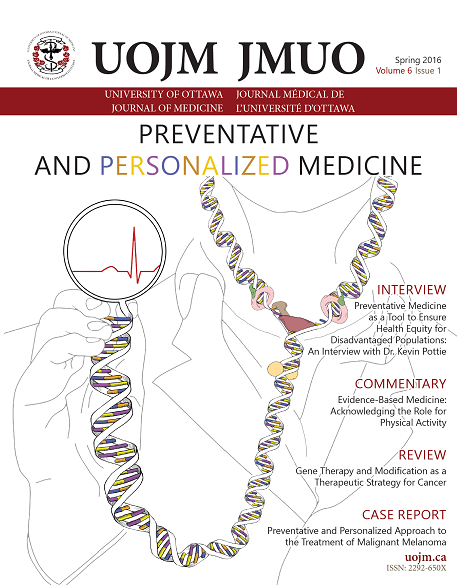Doctor Jérôme Lejeune’s Gaze at the University of Ottawa
DOI:
https://doi.org/10.18192/uojm.v6i1.1590Keywords:
genetic medicine, advocacyAbstract
From January 29th to February 1st, 2015, a group of University of Ottawa undergraduate students and I hosted an exhibit about the life and research of French physician Dr. Jérôme Lejeune, who in 1959 discovered Trisomy 21, the genetic origin of Down syndrome (DS). Considered the father of modern genetics, Dr. Lejeune believed medicine should serve the patient and not the disease. The exhibit focused on Lejeune’s profound humanity and compassion that accompanied his commitment to scientific truth. It also showed how this great scientist maintained an unshakeable adherence to his faith and conscience despite challenges and adversity.
Du 29 janvier au 1er février 2015, un groupe d’étudiants au premier cycle universitaire ont organisé une exposition portant sur la vie et les travaux de recherche du médecin français Dr Jérôme Lejeune, qui en 1959 a découvert la trisomie 21, l’origine génétique du syndrome de Down. Dr Lejeune est considéré comme le père de la génétique moderne. Il croyait que la médecine devait se concentrer sur le patient et non seulement sur sa maladie. L’exposition a mis en valeur l’humanité et la compassion du Dr Lejeune en illustrant comment ce grand scientifique a su maintenir sa foi et ses croyances malgré les défis à relever.
References
2. Lejeune J, Gauthier M, Turpin R. Les chromosomes humains en culture de tissus. CR Hebd Seances Acad Sci. 1959; 248(4):602–603.
3. Lejeune J, Lafourcade J, Berger R, et al. Trois cas de délétion partielle du bras court d’un chromosome 5. CR Hebd Seances Acad Sci. 1963;257:3098–3102.
4. Lejeune J. The William Allan Memorial Award lecture. On the nature of men. Am J Hum Genet. 1970;22(2):121–128.
5. Jerome Lejeune Foundation USA. Legendary Geneticist Jerome Lejeune [Internet]. Ottawa (ON): University of Ottawa, Department of Medicine; 2013 July 29. Available from: https://www.youtube.com/ watch?v=0MA42QKsEWQ.
6. Lejeune J. 21 Thoughts [Internet]. Ottawa (ON): University of Ottawa, Department of Medicine; 2013. Available from: http://lejeuneusa.org/ advocacy/21-thoughts-dr-jérôme-lejeune.
7. Caplan L. Edmund Pellegrino [Internet]. Ottawa (ON): University of Otta¬wa, Department of Medicine; 1986 April 27. Available from: https://www. washingtonpost.com/archive/lifestyle/magazine/1986/04/27/edmund-pellegrino/334406d8-cf5a-4349-8655-0cdbf656f6f3/.
8. Israël L, Arnaldez R. Notice sur la vie et les travaux de Jérôme Lejeune (1926- 1994): séance du mardi 4 mars 1997. Académie des sciences morales et politiques (France), Paris, France, 1997.
9. Strippoli P, Pelleri MC, Caracausi M, et al. An integrated route to identifying new pathogenesis-based therapeutic approaches for trisomy 21 (Down Syndrome) following the thought of Jérôme Lejeune. Sci Postprint. 2013;1(1):e00010.
Downloads
Published
Issue
Section
License
- Authors publishing in the UOJM retain copyright of their articles, including all the drafts and the final published version in the journal.
- While UOJM does not retain any rights to the articles submitted, by agreeing to publish in UOJM, authors are granting the journal right of first publication and distribution rights of their articles.
- Authors are free to submit their works to other publications, including journals, institutional repositories or books, with an acknowledgment of its initial publication in UOJM.
- Copies of UOJM are distributed both in print and online, and all materials will be publicly available online. The journal holds no legal responsibility as to how these materials will be used by the public.
- Please ensure that all authors, co-authors and investigators have read and agree to these terms.
- Works are licensed under a Creative Commons Attribution-NonCommercial-NoDerivatives 4.0 International License.


